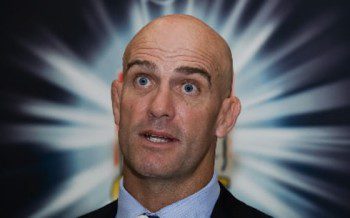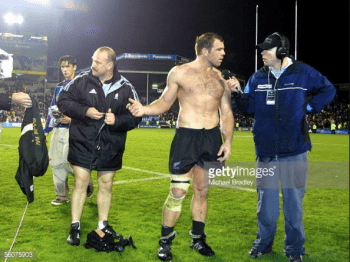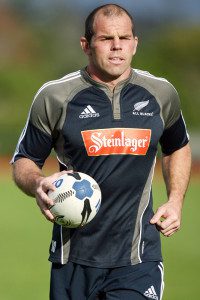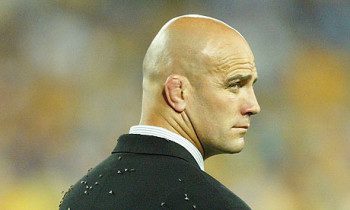AUCKLAND, NZ – News filtered through last week of the appointment of John Mitchell to the head coaching position of the USA Eagles, and it’s fair to say it raised a few eyebrows down in these parts. Despite being a former All Black who then moved on to be a relatively successful coach of the national side, Mitchell’s reputation among New Zealand rugby fans is one of bewilderment rather than respect.
 To understand how ‘Mitch’ came to be viewed in this light, you need to go back to a very different global ruby landscape to the one that exists today. After the 1999 World Cup, the Wallabies were rightful champions and enjoyed regular victories both home and away against the All Blacks. John Hart, the architect of the All Blacks’ only series win on South African soil, fell victim to the new professional era by getting sacked in the fall-out of that World Cup.
To understand how ‘Mitch’ came to be viewed in this light, you need to go back to a very different global ruby landscape to the one that exists today. After the 1999 World Cup, the Wallabies were rightful champions and enjoyed regular victories both home and away against the All Blacks. John Hart, the architect of the All Blacks’ only series win on South African soil, fell victim to the new professional era by getting sacked in the fall-out of that World Cup.
He was replaced by Wayne Smith, the former All Black first five of the early ’80’s, whose tenure always seemed like that of a caretaker (although he was in charge of the team when the All Blacks and Wallabies met in what is generally regarded as the greatest test ever played). After a disappointing couple of years in which the Bledisloe Cup still couldn’t be retained (the Wallabies had held it since 1998), the drums were beating for a new coach. Such high turnover in the head coaching role was a new experience for All Black fans.
Meanwhile, former Waikato and six-game All Black John Mitchell had been coaching ever since he had retired in 1995. His coaching career was almost entirely based in the Northern Hemisphere, rising up to assistant England coach under Clive Woodward. He was appointed coach of the Chiefs Super Rugby team in 2001, despite guiding them to an unspectacular 6th place that season, he was then given the All Black coaching job later that year.
Mitchell came in with a perceived persona of a ‘no nonsense straight shooter’, an All Black himself who knew what it took to wear the jersey. However, he began making some questionable decisions, most notably selecting an under-strength side on his the 2002 end-of year tour. They fell to England at Twickenham and drew with France in Paris, making it the All Blacks’ worst return from a Northern tour in almost 20 years. The New Zealand public had gotten used to England being our whipping boys ever since Jonah danced all over them in 1995, so that loss was a little hard to take, especially as contained some less than legendary selections (Keith Lowen, Danny Lee etc.).
2002 did, however, lead to another Tri Nations (now known as The Rugby Championship) title, but the Bledisloe Cup was lost in a tight Sydney test and questions were starting to be raised about the team’s seeming inability to close out important games. Given the World Cup was only a year away, it was becoming increasingly clear that Mitchell’s job and ultimate legacy would most probably depend on the team’s fortunes at the tournament.

It was around this time that Mitchell’s persona started to raise the hackles of pretty much every rugby correspondent in New Zealand. Questions were always answered with an air of ambivalence, arrogance and often with downright baffling responses. Mitchell’s constant, mystical insistence on claiming that the All Blacks were ‘on a journey’ contrasted harshly with his hard-man reputation and led to ridicule from the general public. As well as this, his selection of assistant coaches smelled very strongly of a jobs-for-the-boys arrangement. Former team mates Ross Nesdale and Darryl Halligan were given cushy roles in the All Black set up, but it was the appointment of Andrew Martin as manager that sticks in the memory the most. The former military man was given the nickname ‘Colonel Cuddles’, due to his over-enthusiastic embrace of the All Blacks returning to the bench during test matches.
However, the results of the 2003 Tri Nations blew a lot of those perceptions out of the water. Record victories over the Springboks and Wallabies in successive weeks (in Pretoria and Sydney, no less) eased the national collective psyche leading into the World Cup. No need to worry about close results when we can just put 50 on the Wallabies on their home ground, right?
The early games in the tournament certainly seemed to support that view, although it’s not like the All Blacks were in a particularly challenging pool. They did hemorrhage 37 points against a very game Wales side (easily a record for the men in red), however the clinical dispatching of the Springboks in the quarter-final led most to believe that a victory in the final was a forgone conclusion.
10 minutes into the semi final against the Wallabies, Stirling Mortlock had other ideas. The big Aussie centre picked off an errant Carlos Spencer pass and galloped 80 metres to score under the posts, setting up an unassailable Wallaby lead and an early flight home for the All Blacks. As well as this, it gave the NZRU a valid reason not to renew Mitchell’s contract post the World Cup. He left the country after a couple of NPC seasons in charge of Waikato, banished to coaching in Australia and South Africa before landing his current job as the US national coach.
Given Mitchell’s overall win percentage of 82%, the NZRU’s decision to punt him into touch actually looks pretty harsh. Given the strength of the Wallabies at the time, the three losses suffered at their hands isn’t anything to cry yourself to sleep over. In fact, that record puts him well inside the top five All Black coaches of all time. So was it his performance off the field that cost him his job?
Pretty much, yes. He got himself offside with the NZ media early and often, mostly by creating a closed-shop environment around the team. Mark Shaw, another one of his mates who landed himself an assistant coaching role, went on record as describing the media as ‘fleas’. This comment wasn’t at all repudiated by Mitchell, adding to the frosty relationship. It got to the point where the most the public heard from ‘him’ was through a satirical series of interviews on Martin Devlin’s Radio Sport breakfast show, in which the fake Mitchell would always begin each sentence with his conceited trademark ‘that’s a very good question, Martin…’

Add in a strained relationship with some senior players, most notably former captain Anton Oliver. In his autobiography, he states that Mitchell allowed, encouraged and participated in a serious drinking culture to the point where the team’s travel plans had to be held up while the coaching staff could recover from their night out.
However, his biggest nail in the coffin was definitely his inability to take on the demands of the All Blacks’ high powered sponsors. Players weren’t made available for sponsorship duties for the likes of adidas, an unbelievable situation in the era of professionalism. The NZRU isn’t a privately owned franchise, and has more or less always been in the financial position of basically sending out its employees at lunch time to scrounge around for change on the streets. So when Mitchell made it more than difficult for the benefactors to get what they needed, his position started looking tenuous, no matter how good the team was playing.
Now, given that press conference tantrums, bizarre behavior and so on are pretty much par for the course for he average American sports fan, this is probably the part in the story where you’re thinking ‘great, he’ll fit right in!’. This may be so, but I wouldn’t count on the Eagles suddenly gaining an 82% test winning record. Mitchell had the benefit of some very, very good players while he was in charge of the All Blacks, but couldn’t always pick the best XV when needed. The most infamous example of this was dropping Christian Cullen (arguably the greatest fullback to ever pull on an All Black jersey) for the 2003 Rugby World Cup, for no other reason than to include the hardly amazing Leon MacDonald in the team.
Mitchell’s record in Super Rugby in charge of the Force and Lions from 2006-2012 is hardly anything to write home about, most tellingly he was given the boot from the South African team after complaints from players about the way he’d treated them. Add in a mysterious departure from Sale after only a few weeks and it’s no wonder he’s been relegated to coaching a South African university side for the past few years. His original fast track appointment to the All Black top job was quite obviously a move by the NZRU desperately trying to put a former player in charge at all costs after the public’s backlash to John Hart. The irony in which Mitchell went about then surrounding himself with his mates and backtracking the All Blacks public relations to 1981-like levels couldn’t have been lost on them.
 So good luck on your ‘journey’, Eagles. It’ll be interesting to watch Mitchell’s progress from here, given the massive amount of attention US rugby will be getting thanks to the Olympics and potential of more All Black/Eagles tests like we saw in 2014. Perhaps Mitchell was never really cut out to be a top flight coach and deal with the peripheral duties that come with it, so a change of pace to a completely different rugby environment could work in his favor.
So good luck on your ‘journey’, Eagles. It’ll be interesting to watch Mitchell’s progress from here, given the massive amount of attention US rugby will be getting thanks to the Olympics and potential of more All Black/Eagles tests like we saw in 2014. Perhaps Mitchell was never really cut out to be a top flight coach and deal with the peripheral duties that come with it, so a change of pace to a completely different rugby environment could work in his favor.
But if it all goes pear-shaped, don’t say you weren’t warned.
That’s it for now! Feel free to comment below, look for and “Like” our Facebook Rugby Wrap Up Page and follow us on Twitter@: RugbyWrapUp, Junoir Blaber, James Harrington, Jamie Wall, Nick Hall, DJ Eberle, Jake Frechette, Scheenagh Harrington, Jamie Loyd, Cody Kuxmann, Karen Ritter, Audrey Youn, Akweley Okine, Rocky Brown and Declan Yeats, respectively.

